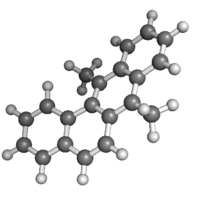7,12-dimethylbenz(a)anthracene
 |
|
 |
|
| Names | |
|---|---|
|
IUPAC name
7,12-Dimethylbenzo[a]phenanthrene
|
|
| Other names
7,12-Dimethylbenzanthracene; 7,12-Dimethyltetraphene; 1,4-Dimethyl-2,3-benzophenanthrene
|
|
| Identifiers | |
|
3D model (Jmol)
|
|
| ChEBI | |
| ChemSpider | |
| ECHA InfoCard | 100.000.326 |
|
PubChem CID
|
|
|
|
|
|
| Properties | |
| C20H16 | |
| Molar mass | 256.35 g·mol−1 |
| Melting point | 122 to 123 °C (252 to 253 °F; 395 to 396 K) |
| Hazards | |
| Main hazards | T (Toxic) |
| R-phrases | R45 R22 |
| S-phrases | S53 S36/37 S45 |
|
Except where otherwise noted, data are given for materials in their standard state (at 25 °C [77 °F], 100 kPa).
|
|
|
|
|
| Infobox references | |
7,12-Dimethylbenz[a]anthracene (DMBA) is an immunosuppressor and a powerful organ-specific laboratory carcinogen. DMBA is widely used in many research laboratories studying cancer. DMBA serves as a tumor initiator. Tumor promotion can be induced with treatments of 12-O-tetradecanoylphorbol-13-acetate (TPA) in some models of two-stage carcinogenesis. This allows for a greatly accelerated rate of tumor growth, making many cancer studies possible.
...
Wikipedia
